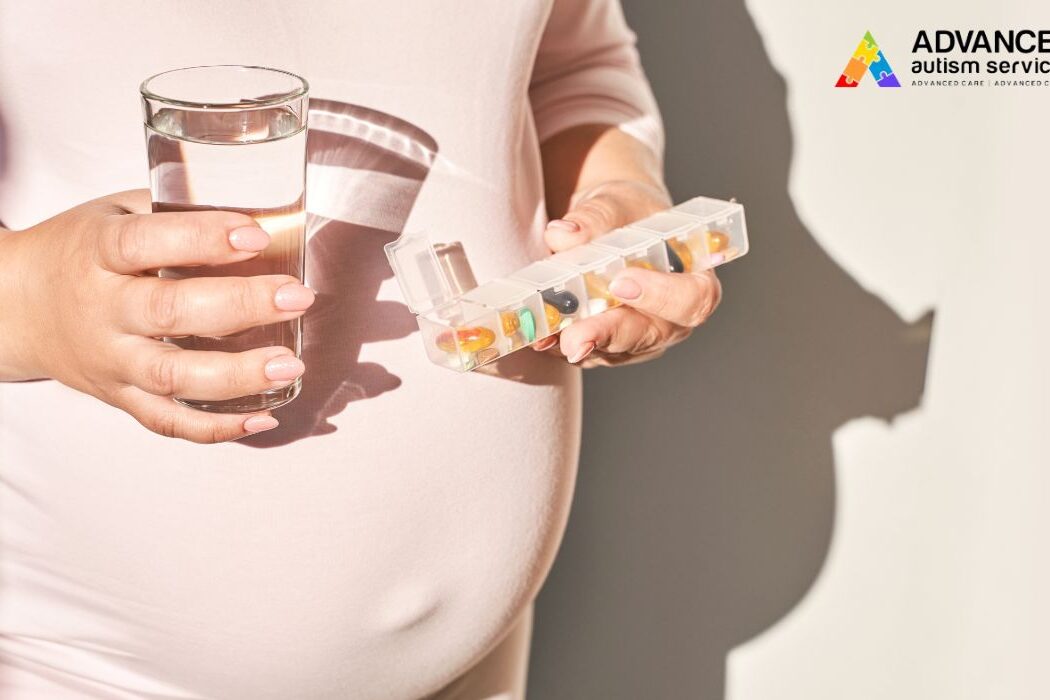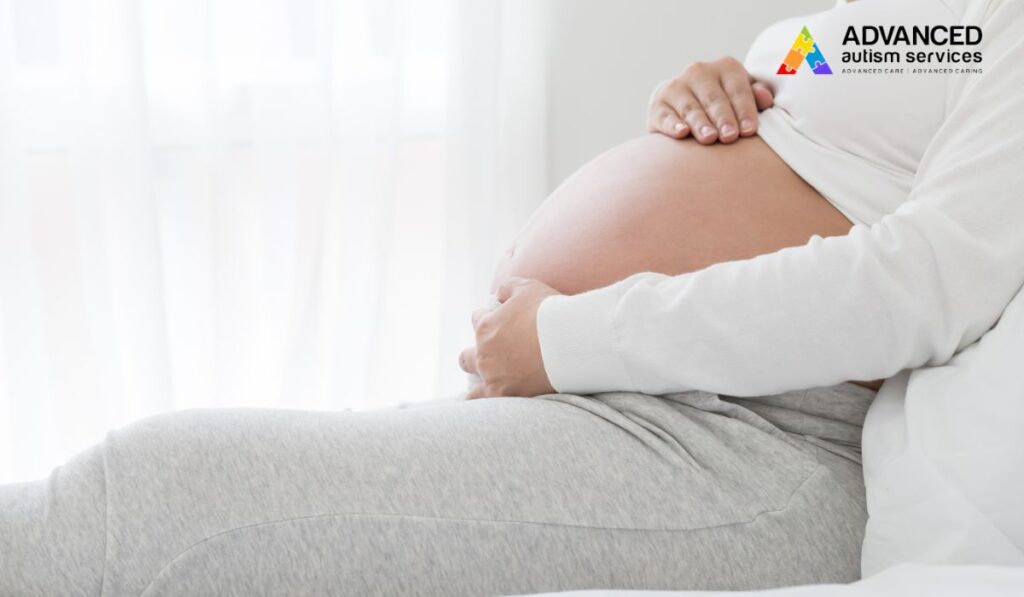The journey to parenthood is a remarkable and transformative experience, but it also comes with its fair share of challenges and uncertainties.
Expectant mothers often encounter stress during pregnancy for various reasons, whether it’s related to work, relationships, health, or the anticipation of becoming a parent.
Amidst these anxieties, there is a growing concern about the potential impact of maternal stress on fetal development, specifically about autism spectrum disorder (ASD).
Can stress during pregnancy cause autism?
Let’s explore the current state of research, potential risk factors, and the need for further investigation.
The Stress During Pregnancy Conundrum
Pregnancy is a period of profound physical and emotional change for expectant mothers.
Stress during pregnancy can arise from various sources, such as work-related pressures, personal relationships, financial concerns, and health-related issues.
This stress can manifest in different ways, including emotional strain, anxiety, and physiological changes.
Expectant mothers may wonder whether their experiences of stress during pregnancy could potentially impact the future development of their child, particularly in terms of autism.
The question is complex and requires a closer look at the current research in this area.
The Role of Maternal Stress
Maternal stress, especially when prolonged and severe, can have a range of physiological and hormonal effects on the mother’s body.
These changes can potentially affect the developing fetus.
Some key points to consider regarding the role of maternal stress include:
Stress Hormones: Stress activates the body’s stress response, leading to the release of stress hormones such as cortisol and adrenaline.
These hormones are critical in various physiological processes, but excessive levels can be harmful.
Placental Function: The placenta, which nourishes the fetus, is influenced by maternal stress.
Changes in placental function can affect the transfer of nutrients and oxygen to the developing baby.
Inflammation: Stress can also trigger inflammation in the mother’s body.
Elevated levels of inflammation during pregnancy have been linked to adverse pregnancy outcomes and potential risks for the developing fetus.
Current Research Findings
The question of whether maternal stress during pregnancy can cause autism is not quickly answered.
Research in this area is ongoing, and findings have been mixed.
Here are some critical studies and results:
The Stress Response and Autism Risk: A study published in JAMA Pediatrics in 2013 explored the potential link between maternal stress and autism.
It found that children born to mothers who had experienced significant stressors during pregnancy had a slightly elevated risk of autism.
However, the absolute risk increase was relatively small.
Stress and Immune Response: Research has also investigated the connection between maternal stress and immune responses during pregnancy.
The immune system plays a crucial role in fetal development.
Stress-related changes in immune function may be associated with an increased risk of neurodevelopmental disorders, including autism.
Genetic and Environmental Factors: Autism is believed to result from a complex interplay of genetic and environmental factors.
Stress during pregnancy may be just one piece of the puzzle.
Some researchers have suggested that the effects of maternal stress on autism risk may be more significant in children with a genetic predisposition to the condition.
Timing of Stress Exposure: Stress exposure during pregnancy may be significant.
Stress during the first trimester, a crucial period for fetal development, may have different effects than focus during the second or third trimesters.
Severity and Duration of Stress: Research indicates that severe and chronic stress during pregnancy may carry a higher risk of adverse outcomes for the child, including a potential increase in autism risk.
It’s essential to recognize that while these findings provide insights into potential associations, they do not establish a direct causal link between maternal stress and autism.
Research in this area is ongoing, and many questions remain.
Potential Mechanisms
Researchers have proposed several potential mechanisms through which maternal stress might influence the risk of autism in the developing fetus:
Epigenetic Modifications: Maternal stress could lead to epigenetic modifications, affecting gene expression in the developing fetus.
These modifications may influence neural development and potentially increase the risk of autism.
Inflammation and Immune Responses: Stress-related inflammation and immune responses may impact the developing brain and nervous system, potentially contributing to autism risk.
Placental Function: Stress may affect placental function, altering the delivery of nutrients and oxygen to the fetus, which can influence brain development.
Hormonal Changes: Stress can change the mother’s hormonal balance, including cortisol levels.
These changes may affect fetal brain development.
Risk Factors and Protective Factors
When examining the question of whether maternal stress during pregnancy can cause autism, it is essential to consider other potential risk factors and protective factors.
Autism is a complex condition, and various elements may contribute to its development.
These include:
Genetic Factors: A robust genetic component is associated with autism.
If a family has a history of autism, this can increase the risk for a child, but it does not alone determine whether a child will develop autism.
Environmental Factors: In addition to maternal stress, other environmental factors have been explored as potential contributors to autism risk.
These may include exposure to toxins, infections during pregnancy, and certain medications.
Nutrition and Prenatal Care: Adequate prenatal care and proper nutrition during pregnancy are crucial for fetal development.
Ensuring a healthy environment for the fetus can be protective.
Early Intervention: Early diagnosis and intervention for autism can lead to improved outcomes.
Access to appropriate therapies and support services can make a significant difference in a child’s development.
Managing Stress During Pregnancy
Given the complex nature of the relationship between maternal stress and autism risk, expectant mothers need to focus on stress management during pregnancy.
Some strategies to consider include:
Seeking Support: Don’t hesitate to seek emotional and practical support from loved ones, friends, and healthcare professionals.
Stress Reduction Techniques: Practicing relaxation techniques like mindfulness, deep breathing, and gentle exercise can help reduce stress levels.
Prenatal Care: Regular prenatal check-ups and appropriate medical care are essential for a healthy pregnancy and reducing potential risks.
Healthy Lifestyle: A balanced diet, regular exercise, and adequate sleep can all contribute to reducing stress and promoting overall well-being during pregnancy.
Conclusion
The question of whether maternal stress during pregnancy can cause autism is a complex and ongoing subject of research.
While some studies suggest potential links between maternal stress and autism risk, the relationship is far from definitive.
Autism is believed to result from a combination of genetic, environmental, and possibly prenatal factors.
Expectant mothers should focus on managing stress during pregnancy to promote their well-being and that of their baby.
Prenatal care, a healthy lifestyle, and seeking emotional support are crucial steps in ensuring a safe and healthy pregnancy.
For more information, resources, and support related to autism, Contact Us.
Explore a wealth of knowledge and guidance to help individuals and families on their autism journey.
FAQs
Can maternal stress during pregnancy cause autism?
The relationship between maternal stress during pregnancy and autism is complex and not fully understood. While some studies suggest potential links, it is not considered a direct cause of autism.
What are some familiar sources of stress during pregnancy?
Stress during pregnancy can stem from various factors, including work-related pressures, relationship issues, financial concerns, health problems, and worries about becoming a parent.
How does maternal stress affect the developing fetus?
Maternal stress can trigger changes in the mother’s body, including releasing stress hormones and inflammation. These changes can influence the fetus’s development, including the brain.
Are all types of maternal stress during pregnancy equally concerning for autism risk?
The timing, severity, and duration of maternal stress during pregnancy may all play a role in potential risk. Severe and prolonged stress may carry a higher risk than occasional stressors.
Are there protective factors against autism risk during pregnancy?
Genetic factors, environmental conditions, proper prenatal care, and early intervention are potential protective factors against autism risk.
How can expectant mothers manage stress during pregnancy?
Stress management during pregnancy can include:
- I am seeking emotional and practical support.
- I am practicing relaxation techniques.
- We are maintaining a healthy lifestyle.
- We are seeking regular prenatal care.
Can maternal stress affect the child’s long-term health beyond the risk of autism?
Prolonged maternal stress during pregnancy can have potential effects on the child’s long-term health, but it is not exclusive to autism risk. It can also impact other aspects of development.
Should pregnant women be concerned about everyday stressors and their impact on the baby?
Everyday stressors are a part of life, and most pregnant women experience them. While it’s essential to manage stress, the occasional stressor is unlikely to have a significant impact on the baby’s development.
Are there specific stages of pregnancy when maternal stress may be more impactful?
Some research suggests that stress during the first trimester, a critical period for fetal development, may have different effects than stress during later trimesters. However, more research is needed in this area.
Where can I find more information and resources about autism and pregnancy?
For additional information and resources related to autism and pregnancy, you can visit “Advanced Autism” at. This website offers valuable guidance and support for families and autistic individuals.




